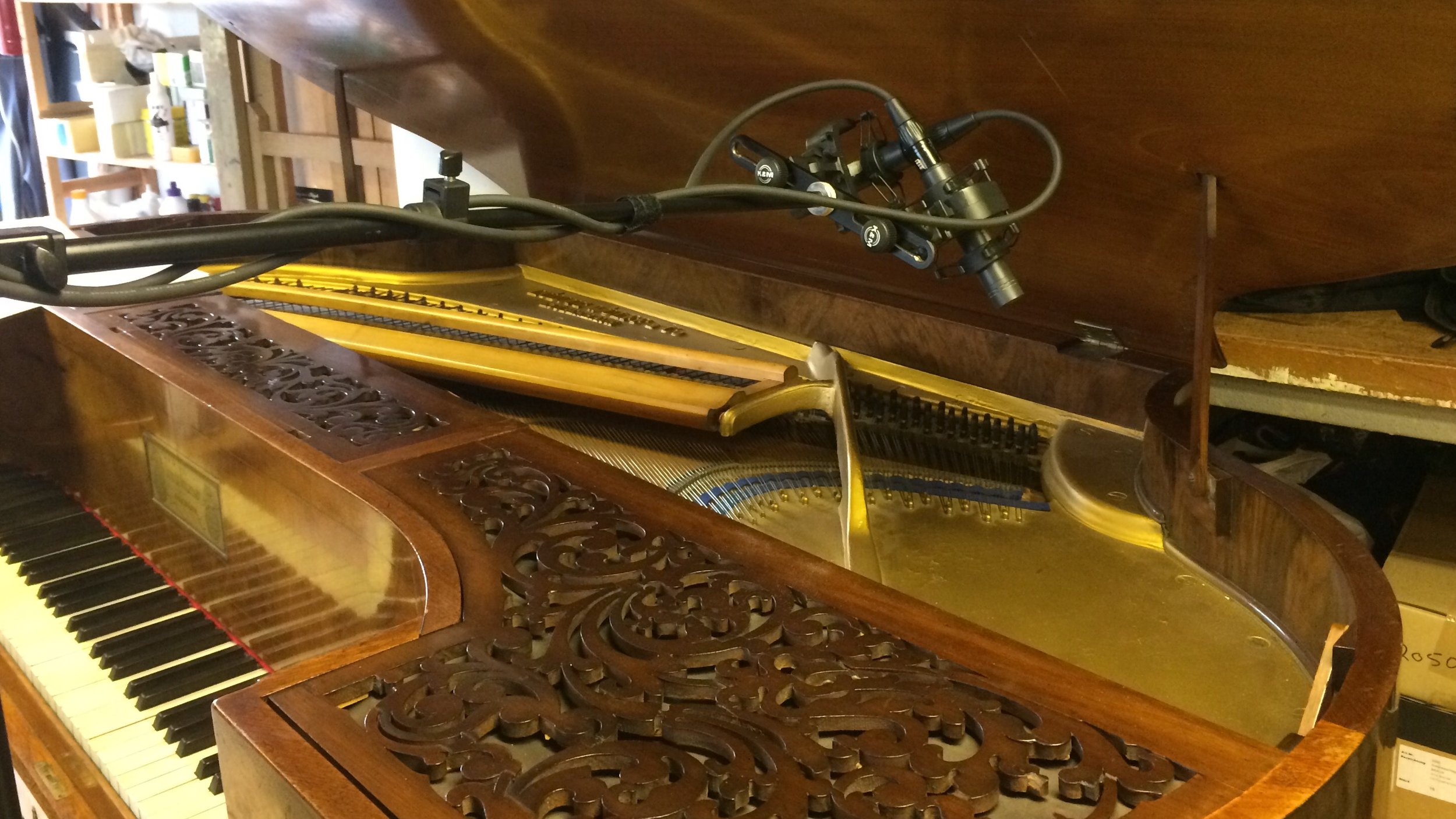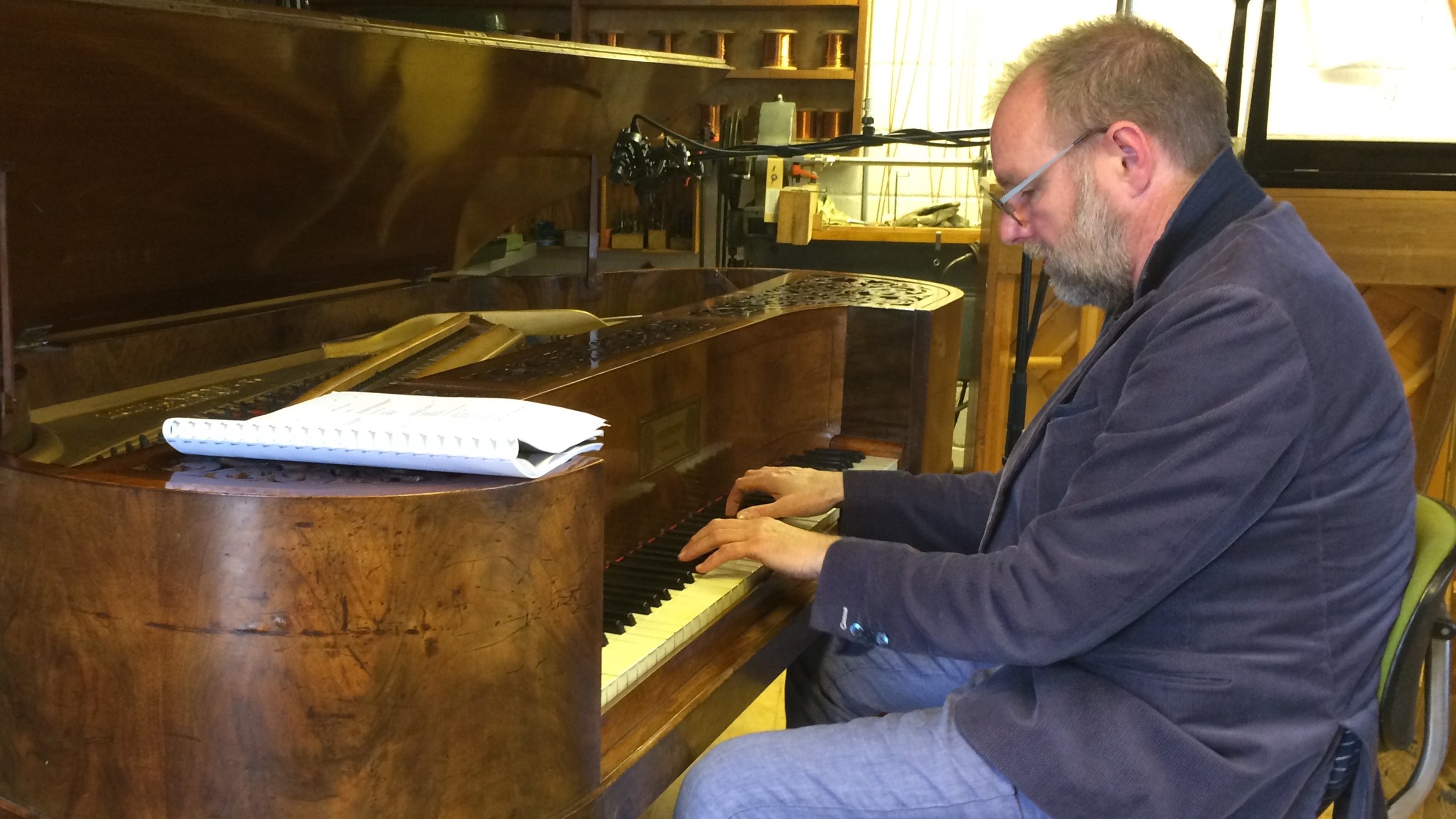AN IMPORTANT CHARACTER
︎piano recording
#fieldrecording
#audiopost
For some time now I have been part of the team that does the sound post production work on the Danish TV series Badehotellet. My role has been mostly connected with sound effects and foley editing as well as mixing some of the trailers but occasionally extends into a bit of field work which is always great fun and in the company of very talented people. Last week was piano recording time.
Badehotellet is a period series where the action is set in the thirties in a hotel by the Danish coast with a plot filled with very colourful characters that pull the viewers in with a good balance of both humour and drama. One of these characters is the bohemian actor Edward Weyse, played by the real actor Jens Jacob Tychsen. Weyse frequently sits by the piano and interprets songs that create interesting narrative arcs with the story. The instrument he plays and its sound have a very expressive value and emotional content which, in my opinion, function almost as a character in themselves. The plan for today was to invoke and capture that character.
With that goal in mind the production team found a 160 year old piano with the right "personality". It's a Ludvig Wulff & Co, with some age related quirks, but fitting perfectly in the period that the series portrays. So, in the morning I joined Jeppe Kaas - one of the series composers - and Søren Kristiansen - an excellent pianist - on our way to the location where the piano lives. There we met Jens Jakob and I started setting up for the recording.
Some technical context before I go into further details; when a music based scene is filmed, a guide track needs to be played during the shoot for the actors to sync their performances to. This guide track needs to fit exactly with the context of the scene, and very importantly, with the mood, rhythm and dynamics that the actors will follow when acting. The recording needs to be right as it cannot be changed in the shooting day where the whole film crew is on set ready to go and time is a very important factor.
Two songs were to be recorded - jazz standards from the thirties. We had a quick brief on the context of the scene so that everyone was on the same page and immediately after is when some interesting overlaps and intersections start to happen. On one side there's the script where the original ideas come from. Then there's JJ and the way he reads and tries to interpret the story and its emotional flow. Then comes Søren, which has to take JJs intention and also interpret and translate the actors ideas into a musical performance. Last, but not least there's Jeppes' thoughts on where to take things as series composer.
Next step was to find a song key where JJ was comfortable. It's always impressive to watch Søren transpose the whole song in seconds without hesitation, but that is what he does and once the best key was found the process moved into the musical interpretation. After a few try out takes he nailed it and everyone was happy. The process was repeated with the next song and not so long after I had the definitive recordings done. Great fun and an interesting process to participate in. Now on with the shooting and editing and the final episodes should be ready for the sound post production work sometime after the summer.
Badehotellet is a period series where the action is set in the thirties in a hotel by the Danish coast with a plot filled with very colourful characters that pull the viewers in with a good balance of both humour and drama. One of these characters is the bohemian actor Edward Weyse, played by the real actor Jens Jacob Tychsen. Weyse frequently sits by the piano and interprets songs that create interesting narrative arcs with the story. The instrument he plays and its sound have a very expressive value and emotional content which, in my opinion, function almost as a character in themselves. The plan for today was to invoke and capture that character.
With that goal in mind the production team found a 160 year old piano with the right "personality". It's a Ludvig Wulff & Co, with some age related quirks, but fitting perfectly in the period that the series portrays. So, in the morning I joined Jeppe Kaas - one of the series composers - and Søren Kristiansen - an excellent pianist - on our way to the location where the piano lives. There we met Jens Jakob and I started setting up for the recording.
Some technical context before I go into further details; when a music based scene is filmed, a guide track needs to be played during the shoot for the actors to sync their performances to. This guide track needs to fit exactly with the context of the scene, and very importantly, with the mood, rhythm and dynamics that the actors will follow when acting. The recording needs to be right as it cannot be changed in the shooting day where the whole film crew is on set ready to go and time is a very important factor.
Two songs were to be recorded - jazz standards from the thirties. We had a quick brief on the context of the scene so that everyone was on the same page and immediately after is when some interesting overlaps and intersections start to happen. On one side there's the script where the original ideas come from. Then there's JJ and the way he reads and tries to interpret the story and its emotional flow. Then comes Søren, which has to take JJs intention and also interpret and translate the actors ideas into a musical performance. Last, but not least there's Jeppes' thoughts on where to take things as series composer.
Next step was to find a song key where JJ was comfortable. It's always impressive to watch Søren transpose the whole song in seconds without hesitation, but that is what he does and once the best key was found the process moved into the musical interpretation. After a few try out takes he nailed it and everyone was happy. The process was repeated with the next song and not so long after I had the definitive recordings done. Great fun and an interesting process to participate in. Now on with the shooting and editing and the final episodes should be ready for the sound post production work sometime after the summer.


